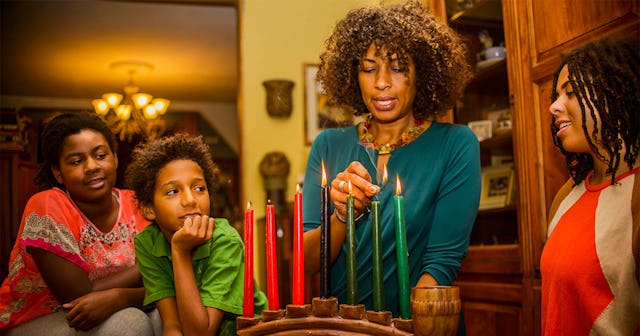Kwanzaa Is Not 'Black Christmas'—Here's What It Actually Is (And How We Celebrate)

The holiday season is upon us and there are holidays from many different cultures, religions and ethnicities to celebrate and learn about. Besides Christmas, most people know about Hanukkah, Diwali and even the winter solstice. However, not many people know much about Kwanzaa. And if there is any year to talk to your kids about Kwanzaa, it’s 2020.
This year, besides the pandemic, we have witnessed one of the most significant movements calling for racial justice and equality since the Civil Rights Movement. The deaths of George Floyd, Breonna Taylor, and countless others at the hands of police officers brought to light inequities faced by Black Americans during a time when our nation was at a “stand still.” And these acts ignited an unprecedented number of people to actively support the Black Lives Matter Movement by participating in marches, sit-ins and boycotts across the world.
Over the summer, small and large companies made public statements against racial inequality and injustice. Many public and political figures took a stance and called for people to take “real” action. And there were first steps towards real conversations about systemic change in many arenas. Lots of people posted blacked-out squares on social media, openly supported Black owned businesses, and committed to learn more about Black history and culture.
As a Black woman, I would really like to see people keep that energy up and continue to do things to follow through on their publicly posted promises. And Kwanzaa is the perfect opportunity to learn about a holiday specifically created to celebrate African American culture and heritage.
Juj Winn/Getty
What is Kwanzaa? It is a nonreligious seven-day celebration that emphasizes family, culture and community. It starts the day after Christmas and and ends on January 1. Kwanzaa, pronounced “kwahn-zuh,” was founded by Dr. Maulana Karenga, a professor and chair, department of Africana studies, executive director of the African American Cultural Center, author and activist. And it is no coincidence that Dr. Karenga founded the holiday in 1966 in the midst of the Civil Rights movement. He believed it to be “an act of cultural recovery and reconstruction.”
No … this is not just a “Black Christmas.” And although it shares many similarities, it is not a knock-off Hanukkah either. Kwanzaa is a celebration of culture, not religion. Dr. Karenga intentionally created the holiday to celebrate African American heritage and traditions, and richly infused it with meaning and symbolism.
Kwanzaa is a Swahili word that translates to “first fruits of harvest” and the celebration is modeled after traditional African harvest festivals. The celebration is rooted in a set of principles known as Nguzo Saba (Seven Principles). Day 1, Umoja, represents unity; Day 2, Kujichagulia, focuses on self-determination; Day 3, Ujima, highlights collective work and responsibility; Day 4, Ujamaa, focuses on cooperative economics; Day 5, Nia, stresses purpose; Day 6, Kuumba, is for creativity; and Day 7, Imani, focuses on faith.
Each principle is represented by a candle placed in a Kinara, the Kwanzaa candle holder. The first three candles are red, honoring the blood of African ancestors; the middle candle is black, representing African American people; and the final three candles are green, signifying the lush lands of Africa. You can find decorations using these colors threaded throughout the celebration such as flags and table cloths.
Of course, gifts are a part of Kwanzaa. However, the tradition is to give handmade gifts or gifts associated with the seven principles mentioned above. Gift giving sometimes happens throughout the holiday, but usually on the last day. The celebration of Kwanzaa officially closes with a closing chant called Harambee, followed by a feast also known as Karamu.
I grew up attending Kwanzaa celebrations with a dance troupe that I performed with in my hometown. We would perform African dances with costumes made from traditional African cloth. I have fond memories of celebrations filled with dancing, music, community and lots of delicious food. They often took place in local churches, community centers and cultural organizations. And I vividly remember leaving these events filled with a sense of pride and belonging.
How can you participate in Kwanzaa? You and your kids can attend a virtual or in-person celebration to experience it for yourselves. Read books about the holiday at story time and watch Youtube videos. Practice the principle of Ujamaa, cooperative economics, by shopping at black owned businesses not only for the holiday season but year round. And you can practice the principle of Ujima, collective work and responsibility, and share what you have learned with family, friends and community members.
If this isn’t a way to learn about and honor an aspect of African American culture and heritage, I don’t know what is. But please remember that Kwanzaa is not a monolithic representation of Black culture. You can use this as a learning opportunity for both you and your children. And you can also see it as one of many ways to help shift how people are consuming and perceiving African American culture and heritage. Because changing that is an important step towards racial equality and justice, and it starts at home with your kids.
This article was originally published on